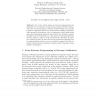286 search results - page 24 / 58 » Reasoning About Partial Functions in the Formal Development ... |
LOBJET
2008
13 years 7 months ago
2008
Self-adapting software adapts its behavior in an autonomic way, by dynamically adding, suppressing and recomposing components, and by the use of computational reflection. One way t...
TLDI
2010
ACM
13 years 7 months ago
2010
ACM
Interactive programs, such as GUIs or spreadsheets, often maintain dependency information over dynamically-created networks of objects. That is, each imperative object tracks not ...
ICFP
2004
ACM
14 years 7 months ago
2004
ACM
Concurrency, as a useful feature of many modern programming languages and systems, is generally hard to reason about. Although existing work has explored the verification of concu...
BIRTHDAY
2003
Springer
14 years 18 days ago
2003
Springer
One of the central axioms of extreme programming is the disciplined use of regression testing during stepwise software development. Due to recent progress in software model checkin...
SIGSOFT
2003
ACM
14 years 8 months ago
2003
ACM
State machine based formalisms such as labelled transition systems (LTS) are generally assumed to be complete descriptions m behaviour at some level of abstraction: if a labelled ...

